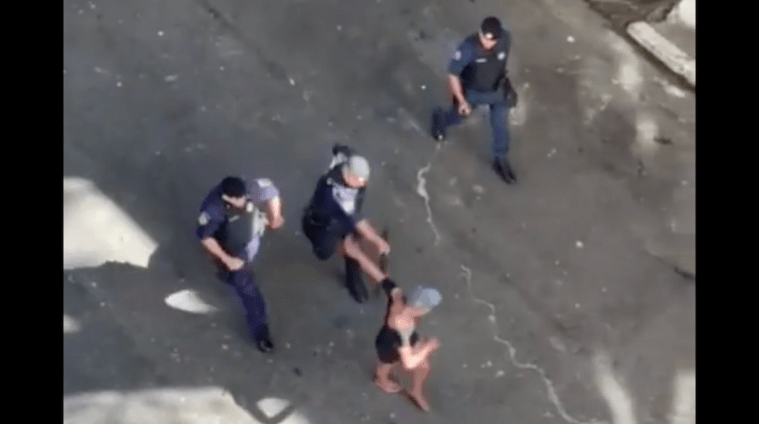Rio de Janeiro, June 7, 2022 – Authorities in Brazil’s São Paulo state must thoroughly investigate the threats of local residents against freelance photojournalist Caio Castor and ensure he can continue to report safely and without fear of reprisal, the Committee to Protect Journalists said Tuesday.
Around 6:30 p.m. on May 28, a group of about 15 people gathered in front of the building where Castor lives with his family in the city of São Paulo, attempted to enter the building, and threatened to “break everything” in his apartment, according to news reports and the journalist, who spoke to CPJ in a phone interview.
Castor told CPJ that, earlier that afternoon, he had filmed three municipal guards hitting a woman and spraying her with what appeared to be pepper spray during a security operation targeting drug users on Helvetia street in downtown São Paulo. He shared the video on Instagram and Twitter, and it was broadcast later that day by TV Globo and embedded by other media outlets.
Local residents who supported the police action and angry with Castor for documenting and exposing the police abuse sent threatening messages via neighborhood WhatsApp groups and gathered outside his residence to confront him, according to news reports and the journalist, who added that threatening messages were also posted on Telegram neighborhood groups.
“Authorities in São Paulo must promptly and thoroughly investigate the alarming escalation of threats and harassment against photojournalist Caio Castor and immediately adopt all necessary measures to ensure his and his family’s safety,” said Carlos Martinez de la Serna, CPJ’s program director, in New York. “Journalists play a vital role in documenting and exposing alleged police brutality and human rights violations, and they must be able to do so without risking reprisal by security forces or anyone else.”
Castor told CPJ that the group was buzzing the intercom and when he picked up, one man yelled, “You bastard, we’ll get up there! We’ll break into your apartment! We’ll break everything.” A friend of Castor called the São Paulo state civil police, he said, and the group dispersed when a patrol car arrived shortly after 7 p.m.
Since May 11, São Paulo city municipal guard and São Paulo state police forces have been conducting frequent operations targeting hundreds of drug users in the area known as “crackland” in downtown São Paulo, forcing the groups to displace and relocate to other areas, according to news reports.
Castor said that during the hours after he posted the video on Instagram at around 2 p.m., members of WhatsApp and Telegram neighborhood resident groups started to post intimidating and threatening messages. Members of the groups also shared his name and address.
According to screenshots CPJ reviewed,messages included threats such as, “[I] want to beat up that guy,” “I hope this person is the next victim.” They also called him an “idiot” and “defender of criminals who film the part that interest him to harm those who are working,” and accused him of “working for organized crime.”
At least two people messaged him on Instagram warning him about the Telegram group members, according to screenshots CPJ reviewed. One member said they “want the death of the drug users and anyone who helps them, including you. They know you live on Helvetia street, they are really angry.”
“In a few hours, the angry speeches in the groups escalated to a physical presence in my building,” Castor told CPJ. “We turned off the lights. They were ringing the intercom repeatedly. At some point, I answered. When one of them yelled they were going to come up and break everything, it was a shock. I thought, we’re screwed.”
Castor filed a police report, which CPJ reviewed, the night of May 28.
Castor told CPJ he and his family left the apartment on the morning of May 29 and haven’t returned since then, fearing for their safety.
Castor told CPJ that, following the May 11 policing operations, a group of drug users had settled on Helvetia street, where he lives, and that local residents formed groups on WhatsApp and Telegram to discuss how to respond to the situation. According to Castor and to screenshots CPJ reviewed, several residents expressed support for the police’s brutal repression of drug users and homeless people. “I thought this was too little,” said one person in the group, referring to the incident Castor filmed.
The press office of the São Paulo State Public Security Secretary said in an email that the journalist “was briefed about the six month deadline to present criminal charges against the perpetrators,” but did not answer CPJ’s questions about the investigation of the incident nor about measures to protect Castor and his family.
The São Paulo city communications secretary said in an email that the Municipal Secretary for Urban Security has “placed on leave the agents filmed [hitting and using pepper spray] and opened internal investigations into the facts.”
Castor has worked as a freelance photojournalist, reporter, and video editor for 10 years, covering human rights, policing, and environmental issues for several national and international outlets including El País, A Pública, BBC Brasil, The Intercept Brasil, and Repórter Brasil.
